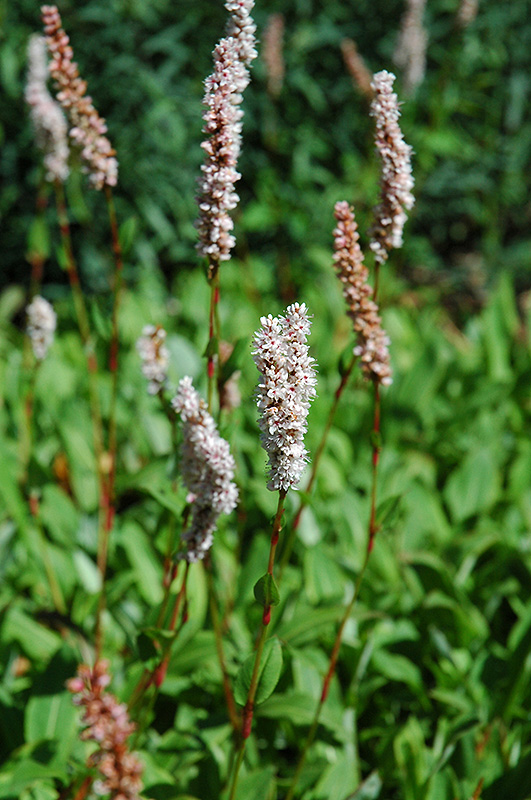Himalayan Border Jewel Fleeceflower
Persicaria affinis 'Himalayan Border Jewel'
Plant Height: 8 inches
Flower Height: 12 inches
Spacing: 15 inches
Sunlight:
![]()
![]()
Hardiness Zone: 3
Other Names: Knotweed, Snakeweed, Polygonum
Ornamental Features
Himalayan Border Jewel Fleeceflower has masses of beautiful spikes of shell pink flowers rising above the foliage from late spring to mid summer, which are most effective when planted in groupings. Its pointy leaves are green in color. As an added bonus, the foliage turns a gorgeous brick red in the fall.
Landscape Attributes
Himalayan Border Jewel Fleeceflower is an herbaceous perennial with a ground-hugging habit of growth. Its medium texture blends into the garden, but can always be balanced by a couple of finer or coarser plants for an effective composition.
This is a high maintenance plant that will require regular care and upkeep, and is best cleaned up in early spring before it resumes active growth for the season. Gardeners should be aware of the following characteristic(s) that may warrant special consideration;
- Invasive
Himalayan Border Jewel Fleeceflower is recommended for the following landscape applications;
- Mass Planting
- Border Edging
- General Garden Use
- Groundcover
Planting & Growing
Himalayan Border Jewel Fleeceflower will grow to be about 8 inches tall at maturity extending to 12 inches tall with the flowers, with a spread of 18 inches. When grown in masses or used as a bedding plant, individual plants should be spaced approximately 15 inches apart. Its foliage tends to remain low and dense right to the ground. It grows at a fast rate, and under ideal conditions can be expected to live for approximately 10 years. As an herbaceous perennial, this plant will usually die back to the crown each winter, and will regrow from the base each spring. Be careful not to disturb the crown in late winter when it may not be readily seen!
This plant does best in full sun to partial shade. It is very adaptable to both dry and moist locations, and should do just fine under typical garden conditions. It is considered to be drought-tolerant, and thus makes an ideal choice for a low-water garden or xeriscape application. It is not particular as to soil type or pH. It is highly tolerant of urban pollution and will even thrive in inner city environments. This is a selected variety of a species not originally from North America. It can be propagated by division; however, as a cultivated variety, be aware that it may be subject to certain restrictions or prohibitions on propagation.

